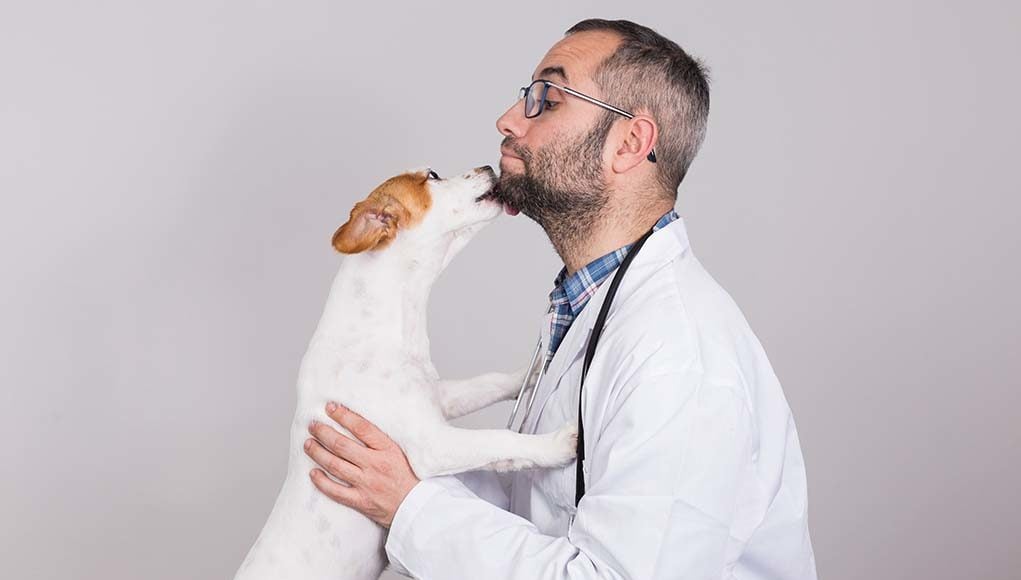Once in a while, you might catch a headline on the news citing the reasons everyone should adopt a pet and some of the benefits that come with being a dog parent. But did you know that there are actually more than just a handful of ways that your dog benefits your health? Below are 20 health benefits of having a dog that you might not have known about.
While there are hundreds of studies analyzing the human-dog bond and interraction, and how it benefits both parties, some studies are lacking in credible evidence. I've gone through a whole bunch of them to pick out the 20 best ones that seem credible enough to make a strong statement of these being real and proven benefits.
In short, here's what we see from most of the research available:
- Dogs benefit children and seniors the most
- Dogs help with various psychological problems in adults
- Dogs improve different health factors through encouraged exercise
For a more thorough look at the health benefits of having a dog, see below.
ALSO READ: 25 Benefits of Kids Growing Up with Pets [Infographic]
20 Proven Health Benefits of Having a Dog
(based on most current research)
1. Increased Levels of Exercise
The older most of us get, the more we dread exercise. Our joints ache, we don’t see the benefits nearly as soon as we used to, we run out of time in the day… and so we skip it. Skipping the gym may seem like a good idea at the time, but according to the CDC, around 80% of Americans don’t get the recommended 2 ½ hours of moderate intensity exercise.
That’s awfully sad when you think about it, but according to a 2017 study published in the Journal of Epidemiology and Community Health, not only were dog owners more active than non-dog owners on pleasant and inclement days, but they also experience much better health overall.
2. Dog Ownership Can Reduce Your Chance of Eczema
Many benefits of having a dog extends to families with children. A 2011 paper published in the Journal of Pediatrics revealed that in a study of 636 children, the rate of eczema was much lower in children whose family owned a dog. While this study sample is quite small and further research needs to follow, the results are both surprising and, for dog owners, just one more reason why dogs rock.
3. Dogs Help to Prevent Social Isolation
If you want to be less lonely or become a better communicator – get a dog. Because a 2015 peer-reviewed research article titled “The Pet Factor – Companion Animals as a Conduit for Getting to Know People, Friendship Formation and Social Support” found that owning a dog leads to greater levels of interaction between people. This interaction leads to the development of friendships and social support networks and also results in decreased feelings of loneliness and isolation.
4. The Development of Emotional Bonds
For people struggling with feeling emotional contact, benefits of having a dog are just as great. A 2016 peer-reviewed research article titled “Highly Educated Men Establish Strong Emotional Links with Their Dogs: A Study with Monash Dog Owner Relationship Scale (MDORS) in Committed Spanish Dog Owners” found that highly educated men, a group who are seldom recognized for strong emotional attachment, are more likely to develop strong emotional bonds with their dogs as opposed to their less educated counterparts.
5. Dog Owners Are Happier!
Not surprising to most pet owners, you'll be happier with you have a pet at home (and you'll make the animal happier too). A 2003 study titled “Neurophysiological correlates of affiliative behaviour between humans and dogs” found that positive interaction (from 5 to 24 mins. in duration) between dogs and people resulted in an increase in dopamine levels in the brain in both humans and dogs. Dopamine is one of the neurotransmitters that play an important role in feelings of happiness and low levels of dopamine have been associated with depression.
6. Reduced Feelings of Pain
The same 2003 study titled “Neurophysiological correlates of affiliative behaviour between humans and dogs” cited above also found that positive interaction (from 5 to 24 mins. in duration) between dogs and people resulted in an increase in beta-endorphin and oxytocin.
Beta-endorphins and oxytocin both play an important role in our ability to manage pain and our individual pain thresholds. Another study back in 1996 also found that the benefits of having a dog are related to decreased consumption of pain relievers. Patients in the study were less reliant on pain medication while undergoing animal based therapies.
7. Reduced Anxiety
Owners often worry about reducing anxiety in dogs, and ironically, dogs can reduce anxiety in people. A lot of studies (including the 2003 study cited twice above) have found that positive interaction between humans and their dogs results in a decrease in feelings of anxiety. This is largely found to be the result of decreased glucocorticoid (a stress hormone) levels and increased dopamine and oxytocin levels.
8. Decreased Blood Pressure
One of the more important health benefits of having a dog is a reduced risk of heart problems. Several studies of human and dog interaction have found that positive interaction between humans and their dogs leads to a decrease in blood pressure.
Decreased blood pressure has numerous positive benefits including a decreased risk for stroke and blood clots. High blood pressure is also very taxing on your heart and can lead to poor heart health including ischemic heart disease. For those dog owners who already have good heart health, you’ll also be happy to know that having a dog makes you less likely to get heart disease because of the effect your dog has on your blood pressure.
9. Reduced Allergies and Asthma in Children
According to Alan Beck, ScD, director of the Center for the Human-Animal Bond at Purdue University babies who are raised in families with pets are less likely to develop allergies and asthma. Beck notes that the biggest benefits of having a dog come from exposing the child to the family pet before they are 6 months old.
In support of this, Beck cites multiple studies that show children who live with dogs or cats have fewer ear infections and colds during their first year compared to babies living in homes without pets.
10. Dog Owners Tend to Live Longer
It may seem like a “no-brainer” based on the positive influences and all the above cited proven health benefits of having a dog, but studies have the data to back up the claims. In fact, one study found that dog-owners who survived a heart attack were more likely to live through the following year than their non-dog-owning counterparts.
Another study found that people who live alone with a dog are 35% less likely to die from myocardial infarction and 28 percent less likely to die of an ischemic stroke than someone living alone without a dog.
11. Dogs Help with Weight Loss!
A small-scale study in 2010 found that public housing residents who “borrowed loaner” dogs to walk five times a week were able to lose an average of 14.4 pounds over twelve months. While it's clearly related to our first point of health benefits of having a dog regarding more exercise, there's an important distinction to make. The paper does state that the participants in the study did not feel that they were exercising, rather they felt like they were fulfilling a responsibility to the dog they were walking.
12. Decreased Doctor Visits for the Elderly
In addition to health benefits of having a dog around children, as well as benefits for adult’s health, a 2017 study in the Journal of Personality and Social Psychology found that seniors who owned pets and were receiving Medicare benefits were less likely to make contact with their doctor than their non-pet-owning counterparts. This study also noted that dogs were particularly beneficial to senior citizens when compared to cats.
13. Improved Well-being in Alzheimer’s Patients
Multiple studies on the interactions between dogs and Alzheimer’s patients have shown that symptoms of Alzheimer’s are soothed through positive interaction with dogs. In particular, studies have found that the companionship of dogs reduces the incidence of emotional outbursts and aggression in Alzheimer’s patients. To reap even more health benefits of having a dog, it's even better to adopt an animal earlier for people who may be predisposed (genetically) to Alzheimer's disease before the symptoms occur.
14. Decreased Triglyceride Levels
According to one article released by Harvard Health Resources, there is evidence that one of the biggest health benefits of having a dog is associated with low cholesterol and triglyceride levels when compared to the cholesterol and triglyceride levels of non-dog-owners. Researchers involved in this study could not explain these differences in cholesterol and triglyceride levels through diet, smoking, or body mass index.
15. You Get Sick Less Frequently
Nobody likes getting sick and with all of the controversy surrounding the chemicals in cleaning products, there’s one more reason to love dogs. Love them as we do, though, our dogs are covered in germs and they bring those germs into our home… it’s okay if you’re thinking of your toddler right now too.
Now, researchers say that when these germs come into your home they increase the diversity of germs that you and your family are exposed to which helps to build up your immunity. For this reason, people with dogs get sick much less often than those without!
16. Dogs in the Workplace Lower Stress Levels
If you’re lucky enough to work for a company that allows dogs in the workplace then you are not only benefiting from extra time with your dog during the day, but you are also benefiting from decreased workplace stress, according to some studies.
For example, one study in particular published in the International Journal of Workplace Health Management found that the presence of dogs in the workplace resulted in employees who felt less stressed and more satisfied with their job. So the next time you go to an office, pitch this or other benefits of having a dog around to your boss.
17. Increased Empathy
A 2017 study found that children (particularly those between 7 to 12 years old) who were attached to a pet were both more compassionate and more positive towards animals. In turn, these feelings led to an increased feeling of well-being for dogs and children both.
This study also noted a possible correlation between a dog’s ability to help children to regulate their emotions by being able to “trigger and respond to attachment-related behavior.”
18. Increased Understanding of Responsibility
It may seem peculiar to note responsibility as a health benefit but for many people, the responsibility that they learn from caring for a pet leads to more responsible caring for the self. For example, a child who is reluctant to regularly brush their teeth can be shown the importance of this responsibility by putting them in charge of helping to brush their dog’s teeth (have them fetch the toothbrush and toothpaste rather than do the actual brushing).
As you brush your dog’s teeth you can use the opportunity to teach your child how important this responsibility is and why. Your child can then take that lesson and apply it to their own life and realize why brushing teeth is important for them too. Many similar scenarios can be applied to this case as well.
19. Improved Communication in those with Communication Impairment
Multiple studies on individuals with autism and dogs have shown that children with communication difficulties resulting from autism are benefiting from improved communication within their family when they have a support dog. These children also greatly benefit from the social interaction that having a dog around brings because it makes socializing with peers more comfortable and easier to do because their familiar dog is the center of attention.
20. Reduction of PTSD Symptoms
Numerous studies have focused on the ability of dogs to help those with PTSD to cope with the anxiety, disorientation, and depression that come along with PTSD. These studies have found that dogs are beneficial to soldiers suffering from PTSD because they provide a companionship that can be trusted.
Most studies have focused on the health benefits of having a dog that's considered a therapy animal. However, some studies show that even non-therapy dogs can offer the benefit of stress and anxiety reduction and a point to refocus on for military members who find themselves in the midst of a PTSD episode.
 One veteran even said that his dog helped him to remember “feelings of love” which lifted him out of the fog of PTSD and reminded him of the goodness in the world, effectively redirecting his attention and helping him to center himself.
One veteran even said that his dog helped him to remember “feelings of love” which lifted him out of the fog of PTSD and reminded him of the goodness in the world, effectively redirecting his attention and helping him to center himself.
The above twenty health benefits of having a dog are just a few of the reasons why we love dogs. If you’re interested in learning more about the scientific research on the benefits of having a dog in your life, we encourage you to keep an eye on scientific publications like our Dog Science section, as well as Time Magazine and peer-reviewed research study journals in PubMed or similar.
READ NEXT: 4 Scientifically Proven Physical and Social Benefits of Owning a Dog
Want To Share This…















